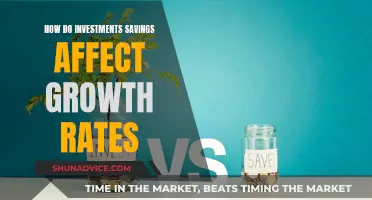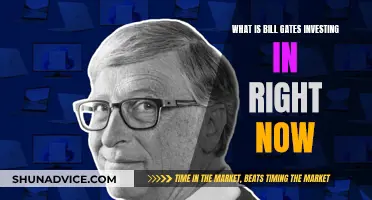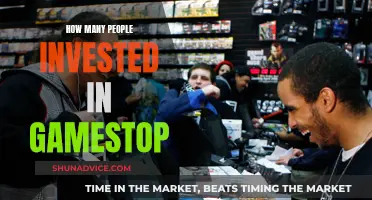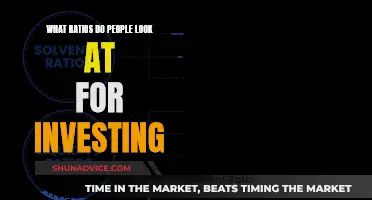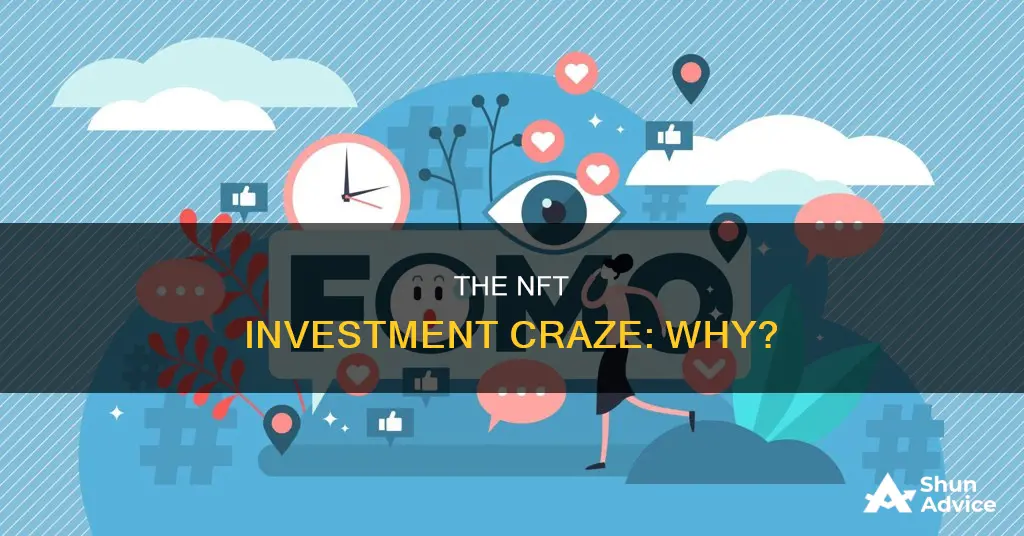
Non-fungible tokens (NFTs) are unique digital assets that can be bought and sold using cryptocurrency. NFTs are often bought and sold by crypto investors, but they are not cryptocurrencies themselves. NFTs are typically certified using blockchain technology, and they are unique, non-interchangeable assets that come with proof of ownership.
There are several reasons why people are investing in NFTs. Firstly, the pandemic, the rise in Bitcoin prices, and distrust in the US dollar have created a perfect storm for alternative investments. NFTs are also seen as a modern approach to investing in art, similar to investing in gold or Bitcoin. Additionally, the sense of scarcity and uniqueness that comes with NFTs creates a fear of missing out and encourages potential buyers to act quickly. NFTs also provide a direct connection between creators and buyers, allowing artists to sell their work without relying on galleries or auction houses and keep more of the profits. Finally, the NFT market is expected to mature, leading to more standardized practices and making it more accessible and understandable for mainstream consumers.
| Characteristics | Values |
|---|---|
| Accessibility | Anyone with a working computer, an internet connection, and knowledge of NFT marketplaces can invest in NFTs. |
| Portability | NFTs can digitally signify from an app or website any item that benefits from having its ownership documented. |
| Legal evidence | NFTs are minted and hosted on blockchain technology, which is a tamper-proof ledger, making it easier to prove ownership of an asset. |
| Fractional ownership | NFTs can divide ownership of items efficiently through primary markets and resell them quickly through secondary markets, improving liquidity to markets for those goods. |
| Market regulation | NFTs are an unregulated asset class with little to no investment laws and consumer protections in most jurisdictions. |
| Fraud, scams, and crime | NFT transactions are vulnerable to fraud, scams, and crime as anyone can make claims about an NFT, execute an NFT transaction, and set up an NFT marketplace online. |
| Limited legal rights | NFTs can document ownership and provide substantiating evidence in a dispute, but they can't prevent the tokenized asset from being contested and pirated. |
| NFT security | NFT security is largely self-managed unless the NFT was purchased through an external party. |
| Dual investment structure | The value of the NFT is tied to the value of the underlying asset, and the investment fundamentals for both need to be considered in parallel. |
| Perceived sense of rarity | As NFTs can only have one owner, they create a sense of scarcity, which encourages potential buyers to fixate on a particular piece. |
| Autonomy for artists | NFTs allow artists to sell their artworks directly to buyers without relying on galleries or auction houses, allowing them to keep more of the profits. |
What You'll Learn
- NFTs are unique, one-of-a-kind tokens that indicate ownership of a digital asset
- They facilitate direct artist-to-consumer transactions, cutting out the middleman
- NFTs are bought and sold using cryptocurrency
- They are susceptible to market manipulation, fraud, scams and money laundering
- The NFT market is very new and extremely volatile

NFTs are unique, one-of-a-kind tokens that indicate ownership of a digital asset
Non-fungible tokens (NFTs) are unique, one-of-a-kind tokens that indicate ownership of a digital asset. They are similar to cryptocurrencies but with key differences. NFTs are bought and sold using cryptocurrencies such as Bitcoin and Ethereum, but they are not cryptocurrencies themselves. NFTs are created on a blockchain, much like cryptocurrencies, and they are typically certified using blockchain technology.
NFTs are unique digital assets that can be anything from art, music, and sports trading cards to virtual land, in-game collectibles, and even real-life collectibles. They are used to indicate ownership of a particular digital item, often a digital artwork. When someone buys an NFT, they purchase the exclusive ownership of a particular digital asset. However, this does not mean that they own the exclusive rights as to who gets to look at or share that particular artwork.
The allure of NFTs is not just in their novelty and potential for appreciation but also in how they facilitate direct artist-to-consumer transactions. There is often a sense of scarcity around NFTs, as they can only have one owner at any one time, creating a sense of exclusivity. This has disrupted markets around the globe, from art to gaming, events to insurance, and collectibles.
NFTs also provide a unique connection to the creator that does not exist with any other art form. They have spawned entire communities online and have become a way for digital artists to claim ownership of their work and earn money from it. NFTs can also be used to fractionalize ownership, improving liquidity to markets and opening up an alternative avenue for streamlined crowdfunding.
Songs: The New Investment Avenue
You may want to see also

They facilitate direct artist-to-consumer transactions, cutting out the middleman
Non-fungible tokens (NFTs) are cryptographic tokens that are recorded on blockchain ledgers and represent ownership of a digital or real asset. NFTs facilitate direct artist-to-consumer transactions by enabling artists to sell their work directly to the public or collectors through an exchange. This direct-to-consumer model has become increasingly popular across industries, and the art market is no exception.
NFTs allow artists to communicate their narrative and carry out sales directly without mediators, giving them greater agency and a larger cut of the proceeds from their work. Artists can now sell directly to collectors, bypassing the traditional gallery system and its associated high transaction costs. This model also allows artists to have more control over their work and its distribution, as well as the ability to build a direct relationship with their fans and customers.
For example, the Los Angeles-based digital artist Sarah Zucker prefers selling her work through NFTs as it allows her to communicate her narrative and carry out sales directly. She no longer has to give 50% of a sale to a gallery and has more control over her work and its distribution.
Another benefit of NFTs is that they can be used to raise funds for projects. For instance, in November 2022, Poolsuite FM, the sister project to sunscreen brand Vacation, raised $2.6 million through the sale of 2,500 NFTs that gave buyers early access to new Vacation products and in-person events.
Additionally, NFTs can be used to unlock exclusive content, products, and events. For example, Dolce & Gabbana airdropped their DGFamily NFT holders phygital NFTs that could be redeemed for made-to-order clothing and sneakers, while PUMA introduced two new sneakers during New York Fashion Week that were also available in their token-gated digital space, BlackStation.
Overall, NFTs provide a direct channel for artists to connect with their audience and offer their work, cutting out the middleman and enabling a more direct and profitable relationship for the artist.
Retirement Planning: Where to Invest Your Money
You may want to see also

NFTs are bought and sold using cryptocurrency
Non-fungible tokens (NFTs) are similar to cryptocurrencies but with key differences. While transactions for both are recorded on blockchain ledgers, NFTs also represent ownership in a digital or real asset. NFTs are blockchain representations of an asset.
Most NFTs are purchased with ether (ETH), the native currency of the Ethereum network, which can be converted from U.S. dollars on exchanges like Coinbase, Gemini and Kraken. Other cryptocurrencies used to buy NFTs include Solana, Wax and other tokens.
To use NFT marketplaces, you first need to establish a digital wallet to store your cryptocurrency. Digital wallets can be established through platforms like Gemini, Metamask, Binance and Coinbase. Once established, you can then link this wallet to the marketplace account where you plan to buy NFTs.
Some NFT marketplaces, such as Ebay's KnownOrigin, are now enabling people to buy NFTs using fiat currency via credit and debit cards.
Retirement Planning: When Do People Start?
You may want to see also

They are susceptible to market manipulation, fraud, scams and money laundering
The NFT market is susceptible to market manipulation, fraud, scams, and money laundering.
NFTs are unregulated, and there is little to no investment law or consumer protection in most jurisdictions. This lack of regulation means that market manipulation and misinformation can run rampant, with speculative hype contributing to inflated prices, volatility, and pump-and-dump schemes. NFTs are also vulnerable to wash trading, where a seller executes a transaction in which they are on both sides of the trade to paint a misleading picture of an asset's value and liquidity. Wash trading is prohibited in conventional securities and futures, but there has yet to be an enforcement action regarding wash trading involving NFTs.
The remote nature of NFT transactions also makes it difficult to vet physical goods purported to be the tokenized asset and to maintain compliance with anti-money laundering (AML) laws. NFTs are also vulnerable to money laundering due to the pseudonymity of cryptocurrency. Criminals can purchase NFTs with illegally gained funds, sell them later, and then have seemingly clean money with no connection to the original criminal activity.
NFT scams typically involve fraudsters trying to access an individual's NFT account to steal their NFTs or funds. Scammers use phishing scams to trick people into giving up their private wallet key, which is essentially the password to their NFT account. They also create fake NFT projects and prey upon people's fear of missing out and the lure of a quick buck to make them invest. Once the NFT gathers steam and investments pour in, the fraudsters vanish with the funds. Celebrity endorsements are also used as a technique to manipulate the markets. This normally involves a group of crypto organizers that have cleverly devised a scheme that requires a famous face to promote NFTs before running off with the profits.
To protect yourself from NFT scams, it is essential to take the following precautions:
- Be cautious of clicking links and never share sensitive information unless you're sure the link is legitimate.
- Always research and verify an NFT and the seller's identity and history before making a purchase.
- Use a virtual private network (VPN) to encrypt and anonymize your NFT traffic, adding an extra layer of security.
- Never share your private key or password with anyone or any website.
- Use a cold storage wallet to keep your digital assets offline.
Goldman Sachs: Applications Flood In
You may want to see also

The NFT market is very new and extremely volatile
The NFT market is still in its infancy, having emerged in 2014, and it is extremely volatile. NFTs are unique digital assets that are bought and sold online using cryptocurrency. As a new phenomenon, the market is unpredictable and it is unclear how it will develop in the coming years.
The value of NFTs is likely to fluctuate; they are non-fungible, meaning they cannot be exchanged for something of equal value. For example, a dollar bill is fungible as it can be easily swapped for another dollar bill. However, a one-of-a-kind trading card is non-fungible as it is unique and has no equivalent value. NFTs are subject to high fluctuations in value and a complete loss of value is possible at any time.
The NFT market is also susceptible to fraud, scams, and theft. As a new market, it is unregulated, and there is little to no investment law or consumer protection in most jurisdictions. This makes it easier for criminals to prey on unsuspecting buyers and sellers. NFT theft is a growing issue, and it can be difficult to recover a stolen NFT.
The longevity of the NFT market is uncertain. While some believe NFTs are here to stay, others view the market as a bubble that will eventually burst. The high energy consumption involved in NFTs and the potential for negative environmental impacts are also causes for concern.
Investing in NFTs carries significant risks and it is not a good idea to invest simply because of a fear of missing out. It is a highly speculative market and buyers should be aware of the potential for losses.
Why Invest in Farms?
You may want to see also


